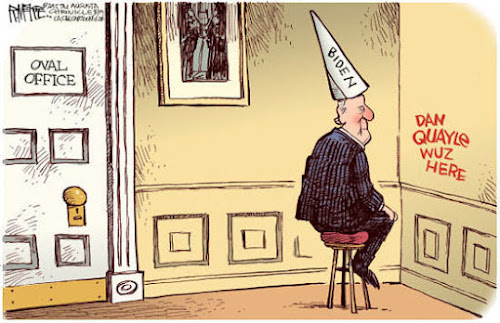Host (Bob Sureshot): We have a special treat today. The Vice President of these United States has agreed to share some of his home invasion defense tips with us. So please give a warm, Sureshot welcome to the Honorable Joe Biden!
Biden: (Jogging out on stage with his trusty double-barreled 12 gauge) Bob it is so great to be here. I've been looking forward to this all week. Every morning a Chris Matthews chill runs up my leg.
Bob: Ummm, thanks. I think. So Mr. Vice President, what gives with all these new gun laws? You know as well as I do that the research shows they won't reduce violent crime.
Biden: Well Bob, that may be so, but we have to do something, right? Anyway, we still have our shotguns (Biden smiles patting 'Ole Betsy' his shotgun) unless of course you live in Colorado.
Bob: So I've been reading that you are a fan of going out onto your balcony and firing off both barrels to scare off an intruder?
Biden: (Nodding his head vigorously) Yep! With the new changes in gun laws America is going to have to learn to use the shotgun for all its hunting and home defense needs. And you know as well as I that the shotgun is by far the best weapon for home defense. And with a double-barrel you feel like your in the Old West.
Bob: Actually, Joe, I prefer a customized Glock 22 in .40 cal. But please tell us about the balcony thing.
Biden: Well, I raised my kids and wife showing them how to scare off a boogie man using loud noises like banging pots and pans, playing recordings of Joy Behar really loud, or firing off a shotgun blast. A guy trying to break in will hightail it outta town when two shotgun rounds go off. Also, just the sound of pumping the action on your shotgun may prove enough.
Bob: But Joe, you don't have a pump-action. It's a double-barrel with a break open action.
Biden: Oh yeah...anyway. Just opening my gun produces an audible clicking sound. And you know what that sound means Bob?
Bob: What Mr. Vice President? (Showing obvious confusion)
Biden: TROUBLE! Ha Ha. (Funny grin crosses Biden's face.) Let me demonstrate. (Biden tries to open his gun) Damn thing is stuck! (Bangs it on a table) Sometimes the release gets jammed, Ughhh!
Bob: Mr. Vice President, you might need a professional gun cleaning and maybe some gun smithing work for 'Ole Betsy.'
Biden: Naw! (He whacks it again one last time. The action opens, ejecting two 12 gauge rounds which hit the Veep in the forehead. Two red marks begin to appear.) Fuck! That hurt!
Bob: Ummmm...Mr. Vice President, this is a family show, could you watch your language?
Biden: Don't worry Bob. I'm in tight with the Director of the FCC. Not like this isn't the first time I've screwed up and said inappropriate things.
Bob: So you fire both barrels out on the balcony, but what if the intruder is already in your house. I can reload my Glock in a couple seconds, but a break open shotgun is a bit slower.
Biden: True Bob, for the average American, but I'm a life-long gun owner. I bet I can reload as fast as you.
Bob: (Shakes his head doubting the Veeps claim.)
Biden: Wanna race? Come on. Chicken?
Bob: Ok.
The Race: Bob swiftly ejects his empty mag, inserts a new one, and charges the weapon. Looking over he sees the Veep with a pocket knife out trying to eject a round stuck in the right barrel of his gun. Finally it comes free. Biden takes two rounds out of his pocket, dropping one on the floor. He loads one and bends over to get the other, splitting his pants in the process. With second round in hand, he loads it and shuts he action.
Biden: TIME! How did I do?
Producer: Uhhh...thirty-three seconds sir.
Biden: And Bob?
Producer: 3 seconds
Biden: Well, I'm a bit rusty. Pretty busy being President of the United States.
Bob: But your the Vice President.
Biden: I am? Oh yeah. Well there's always 2016.
Bob: God, I hope so (thining there's no way the Republicans could screw up beating Biden). Well that's all the time we have today. This is Bob Sureshot hoping that you are aiming true America.
Producer: And we are clear. (Laughs as Bob says into his mic, "We need to get Biden and Cheney together for a quail hunt. We might win an emmy for that episode.")






